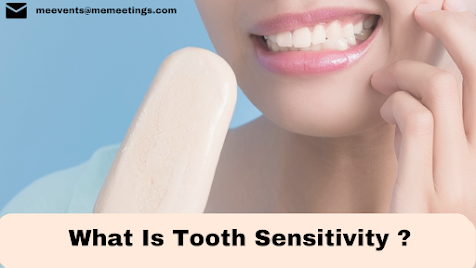What Is Tooth Sensitivity ?
Teeth sensitivity may be the cause of any pain or discomfort you feel after consuming cold or hot foods or beverages like ice cream, coffee, or tea. When someone has dentin hypersensitivity or tooth sensitivity, their teeth are more susceptible to extremes in temperature. When eating hot or cold food, people with sensitive teeth experience sudden pain that quickly goes away. Most studies also show that 10–30% of people have sensitive teeth. One may go through either short-term or long-term pain as a result of their sensitivity. After inspecting your oral health, the dentist will explain the cause of your sensitive teeth. Once he understands the signs of your sensitive teeth he will then recommend an outstanding sensitive teeth therapy. But, this article will assist you in understanding causes, signs, and remedies of numerous sensitive teeth conditions. The best thing would be if you didn't deprive yourself or felt bad about indulging in your favourite foods because of sensitive teeth.
Causes of sensitive teeth
A person's lifestyle and poor oral hygiene practises
may be the main causes of sensitive teeth. Because their enamel is thinner,
some persons may also be sensitive. But in order for you to better understand they have listed the causes of sensitive
teeth below.
• Using a hard toothbrush or applying excessive
pressure to one's teeth when brushing can cause tooth sensitivity.
• One of the factors contributing to dentin
hypersensitivity may be tooth grinding during night.
• A lot of acidic meals and beverages could also be
to blame.
• Gastroesophageal reflux may also be the culprit,
as this condition results in the erosion of teeth enamel due to stomach acid
that travels to the mouth.
• Inappropriate oral care,
Tooth sensitivity may be brought on by cracked,
fractured, or chipped teeth.
• Sensitivity may also result from exposed teeth due
to receding gums.
•Dental procedures like fillings, crowns, etc. may
cause your sensitivity for a specific period of time. Then in a few days, the
sensitivity in a particular location will fade. Certain temperatures, such as
cold and hot, can cause the teeth to experience severe pain or discomfort.
Other health issues or illnesses may also contribute to sensitivity that
affects other body areas. In addition to foul breath, receding gums, redness,
and swelling of the gums are among oral signs of sensitivity.
Sensitive Teeth Symptoms
The additional symptoms that one may experience are connected to various body regions. Heartburn is a possibility.
Heartburn, indigestion, jaw pain, sinus pain,
trouble opening the mouth, and numerous other symptoms. There is also a chance
that additional severe symptoms could point to underlying, major medical
issues. Thus, it is usually preferable to contact the dentist while the level
of sensitivity is lower and to take preventative measures as soon as possible.
You may safeguard yourself from developing serious health concerns in the
future by scheduling regular dental visits.
You can start focusing on your dental hygiene if the
sensitivity is not too extreme. Use a soft toothbrush and toothpaste for sensitive
teeth and start out by brushing lightly. Take the mouthwash without alcohol.
It's time to see the dentist if your sensitivity remains even after you've made
these adjustments and practised proper dental hygiene The likely cause of
sensitivity will be looked for by your dentist, who will look for issues
including loose fillings, cavities, and receding gums.
The dentist will suggest a suitable course of action
after assessing your issue. If you suffer from the most prevalent issue, like
as gum recession, the dentist will advise a gum graft. The tooth's root will be
shielded during this operation. Also, he'll suggest wearing a mouthguard.
Conclusion
Get a consultation with a dentist from a reputable dental facility if you or anybody else in your home has tooth sensitivity. You will avoid future problems and suffering if you manage your sensitivity as soon as possible. But, sacrificing on the quality of the treatment will only make your situation worse; as a result, contact a dental office that employs the most up-to-date technologies and equipment, adheres to proper sterilisation, and utilises safety equipment.


.png)

Comments
Post a Comment